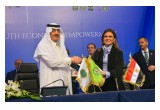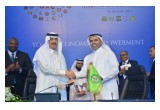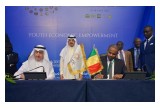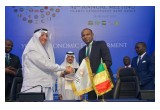The Islamic Development Bank Board of Governors Wraps Up 42nd Annual Meeting on Successful Note
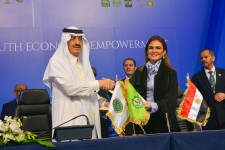
Jeddah, Saudi Arabia, May 22, 2017 (Newswire.com) - The Board of Governors (BoG) of the Islamic Development Bank Group (IDB) expressed its deepest gratitude and appreciation to Custodian of the Two Holy Mosques King Salman bin Abdulaziz for his patronage for the 42nd Annual Meeting of the IsDB in Jeddah from May 14 to 18, 2017, as well as offering unwavering support to the IDB and the Muslim world.
The Board also offered its sincere thanks to HRH Crown Prince Muhammad bin Nayef, Deputy Premier and Minister of Interior, for his continued support to IDB’s efforts, aiming to serve the Muslim world.
The Board extended its deepest thanks to Deputy Crown Prince Muhammad bin Salman, Second Deputy Premier and Minister of Defence, for providing all the facilities to the Group.
The Board also conveyed its appreciation to Minister of Finance Muhammad Al-Jadaan, a member of the BoG, for inaugurating the ceremony and offering his directives, which helped conclude the event successfully.
In his closing address, Dr. Bandar Hajjar, IsDB President, reiterated the Group’s steadfast support for refugees and the displaced through reconstruction efforts, youth empowerment programmes as well as initiatives to reduce unemployment and enhance economic integration in IDB member countries.
“The Group will continue to support health, education and agriculture, and work toward achieving the bank’s objectives to become an institution for development and developers, based on its knowledge and competency to mobilize resources, and adopt necessary changes to meet development requirements,” he added.
In his speech, Abul Maal Abdul Muhith, Chairman of the BoG, called for expediting the efforts to provide an innovative education system instead of the tradition one, a system that stimulates creative thinking and encourages interaction. Unemployment poses enormous challenges to the youth and no economy is capable of creating job opportunities for everyone, he stressed. He further pointed out that it is important to support young men and women set up their own small business enterprises.
Numerous finance agreements worth a total of US$1.2 billion were signed with 17 member countries on the last day of the 42nd Annual Meeting. The agreements were signed with Turkey (US$363 million); Indonesia (US$250 million); Mozambique (US$200 million), Bangladesh (US$47 million); Tunisia (US$80 million); Cameroon (US$73 million); Chad (US$49 million); Comoros (US$2.6 million); Egypt (US$10 million); Mali (US$33 million), Saudi Arabia-based Zamzam Volunteer Health Foundation (US$12 million); Tajikistan (US$20 million); Uganda (US$10 million), and Uzbekistan (US$44.5 million).
The agreements covered technical aid in the form of grants to Somalia (US$280,000), Afghanistan (US$230,000) and Sudan (US$150,000).
Islamic Development Bank signed two memorandums of understanding with the Saudi Ministry of Education and Deutsche Fur Internationale Zusammenarbeit. The first agreement aims to reinforce cooperation in the fields of technical education and higher education while the second one aims to enhance exchange of knowledge and intensify cooperation in projects and studies.
The IDB Prizes for Science and Technology in its 15th edition were given to universities and two faculties. Universitas Indonesia was selected in Category 1 for its scientific and technological contributions and accomplishments, whereas the Faculty of Chemical and Energy Engineering, Universiti Teknologi, Malaysia, won the prize in Category 2 for developing advanced membranes, which are used in gas separation in the oil and gas industry. The prize in Category 3 was given to the Faculty of Medicine, University of Gezira, Sudan, for setting up a unique and innovative system of medical education and training.
A women activist from Algeria and a Palestinian non-profit organization won the Islamic Development Bank Prize for Women Contribution to Development. Mrs. Hamida Kettab from Algeria won the prize for raising public awareness about the importance of cancer prevention and facilitating the early detection of cancer. Palestine-based Dunya Center was selected for the prize for providing screening, early detection, rehabilitation efforts and survivorship services as well as supporting families of affected women.
The Islamic Development Bank Prize in Islamic Economics 1438 H (2017) was withheld for this year. The prize was established in 1408 H (1988) and is given annually in Islamic Economics and Islamic Banking and Finance in alternate years. Twenty-seven researchers have won the prize in both categories ever since its inception.
PR inquiries : nora@hadathgroup.com
Source: The Islamic Development Bank
